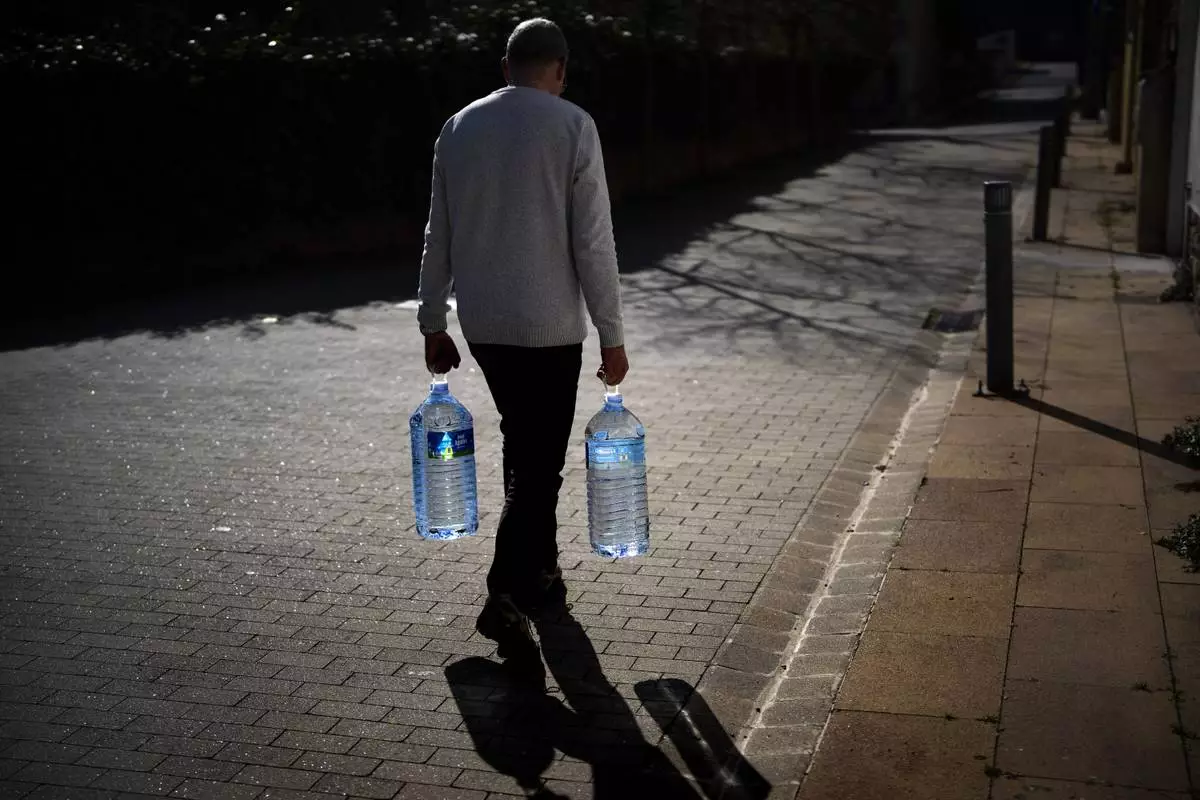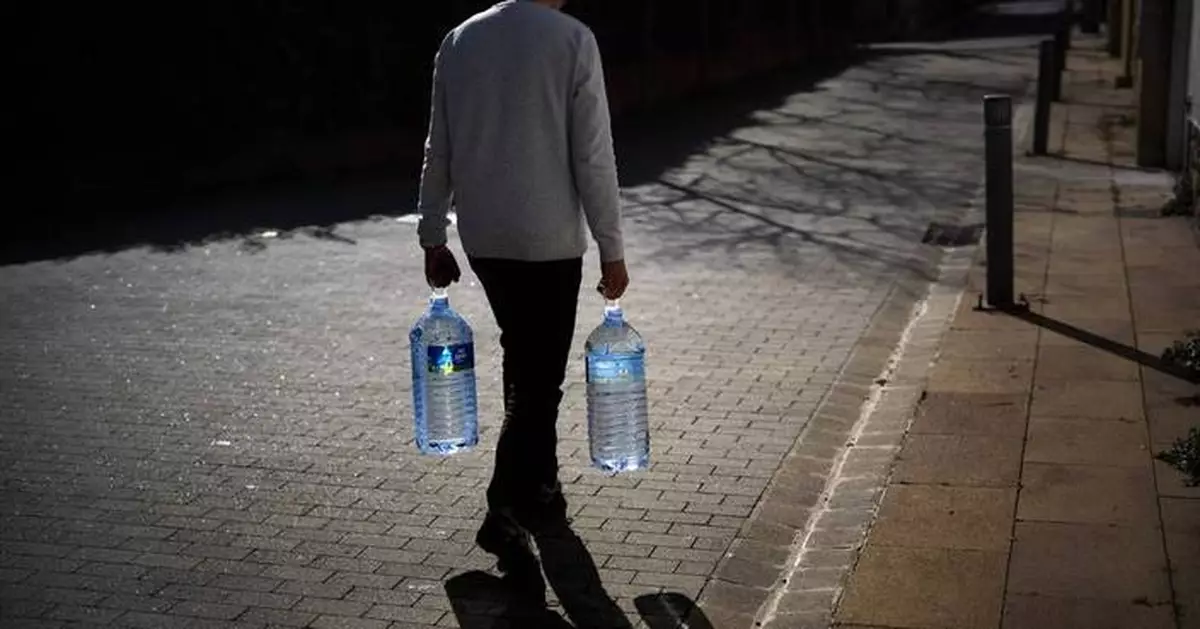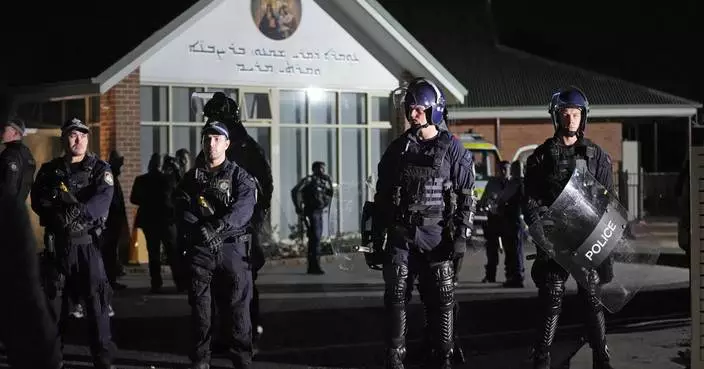BARCELONA, Spain (AP) — Spain’s drought-stricken northeastern Catalonia is considering imposing water restrictions on tourists in the driest parts of the region if domestic consumption is not curtailed, the Catalan government said Tuesday.
The restriction of 100 liters (26 gallons) per tourist per day for hotels would go into effect if a municipality fails to keep domestic water use by residents below established limits for three consecutive months under the current “drought emergency” for Catalonia, officials said.
Barcelona, Spain’s second largest city and the regional capital, uses 160 liters of water per resident per day — well below the current limit of 200 liters, Catalonia's water agency said. That includes uses by residents for both washing and drinking.
Tourism represents nearly 12% of Spain’s economy. But there has been growing pressure by water conservationist groups to limit the use of water by tourists during the drought.
According to Barcelona’s hotel guild, the average tourist to Barcelona in 2022 used some 163 liters per day, while the figure rose to over 240 liters for luxury hotels.
The limits for tourists would not include the water used to fill swimming pools.
Also Tuesday, the Catalan government loosened restrictions that prohibited the filling of swimming pools with fresh water. Under the new measure, a privately-owned swimming pool can be refilled in a severe drought if authorities declare it a “climate refuge” open to residents seeking relief from the heat.
The regional government also made modifications to its drought restrictions to allow for the private use of desalination installations, a move hotel owners have demanded.
Catalonia has borne the brunt of a drought driven by climate change that has also impacted parts of southern Spain, though a wet spring this year has helped the situation. The reservoirs for Barcelona and surrounding areas that were at 15% of their capacity are now 18% full.
Even so, Catalonia has kept in place its restrictions under a water emergency declared in February to combat a drought regional authorities call historic. Those limitations include reducing average water use by 80% for crop irrigation, 50% for herd animals and 25% for industry.
Read more of AP’s climate coverage at http://www.apnews.com/climate-and-environment

FILE - Joan Torrent, 64, walks toward his house carrying two plastic jugs of water refilled at a natural spring in Gualba, about 50 km, (31 miles) northwest of Barcelona, Spain, Wednesday, Jan 31, 2024. Spain’s drought-stricken northeastern Catalonia is considering imposing water restrictions on tourists in the driest parts of the region if domestic consumption is not curtailed, the Catalan government said Tuesday April 16, 2024. (AP Photo/Emilio Morenatti, File)
BERLIN (AP) — Nine people charged in connection with an alleged far-right plot to topple the German government are going on trial Monday in one of three cases linked to the purported conspiracy, which came to light in late 2022.
The trial opening in Stuttgart is the first one and is focused on those defendants of the so-called Reich Citizens group who allegedly were part of the so-called military arm, German news agency dpa reported.
Federal prosecutors in December filed terrorism charges against a total of 27 people, one of whom has since died.
Nine other suspects, among them a self-styled prince and a former far-right lawmaker, will go on trial on May 21 at a Frankfurt state court in the most prominent of the three cases. The other eight will go on trial in Munich on June 18.
The Frankfurt case includes Heinrich XIII Prince Reuss, whom the group allegedly planned to install as Germany’s provisional new leader; Birgit Malsack-Winkemann, a judge and former lawmaker with the far-right Alternative for Germany party; and a retired paratrooper.
The proceedings of the three cases are expected to last well into 2025.
Prosecutors have said that the accused believed in a “conglomerate of conspiracy myths,” including Reich Citizens and QAnon ideology, and were convinced that Germany is ruled by a so-called deep state.
Adherents of the Reich Citizens movement, or Reichsbuergerbewegung in German, reject Germany’s postwar constitution and have called for bringing down the government, while QAnon is a global conspiracy theory with roots in the United States.
According to prosecutors, the group planned to storm into the parliament building in Berlin and arrest lawmakers. It allegedly intended to negotiate a post-coup order primarily with Russia, as one of the allied victors of World War II.
Most of the nine suspects in the Frankfurt trial are charged with membership in a terrorist organization and “preparation of high treasonous undertaking.” The other 17 alleged members of the group have been charged in separate indictments at the courts in Stuttgart and Munich.

FILE - Police officers stand by a searched property in Frankfurt during a raid against so-called 'Reich citizens' in Frankfurt, Germany, Wednesday, Dec. 7, 2022. Nine people charged in connection with an alleged far-right plot to topple the German government are going on trial in one of three cases linked to the plot that came to light in late 2022. The trial that opens Monday in Stuttgart is the first one and focused on those defendants of the so-called Reich Citizens group who allegedly were part of the so-called military arm. (Boris Roessler/dpa via AP, File)

FILE - A police officer carries a plastic box during a raid against so-called 'Reich citizens' in Berlin, Germany, Wednesday, Dec. 7, 2022. Nine people charged in connection with an alleged far-right plot to topple the German government are going on trial in one of three cases linked to the plot that came to light in late 2022. The trial that opens Monday in Stuttgart is the first one and focused on those defendants of the so-called Reich Citizens group who allegedly were part of the so-called military arm. (Paul Zinken/dpa via AP, File)












